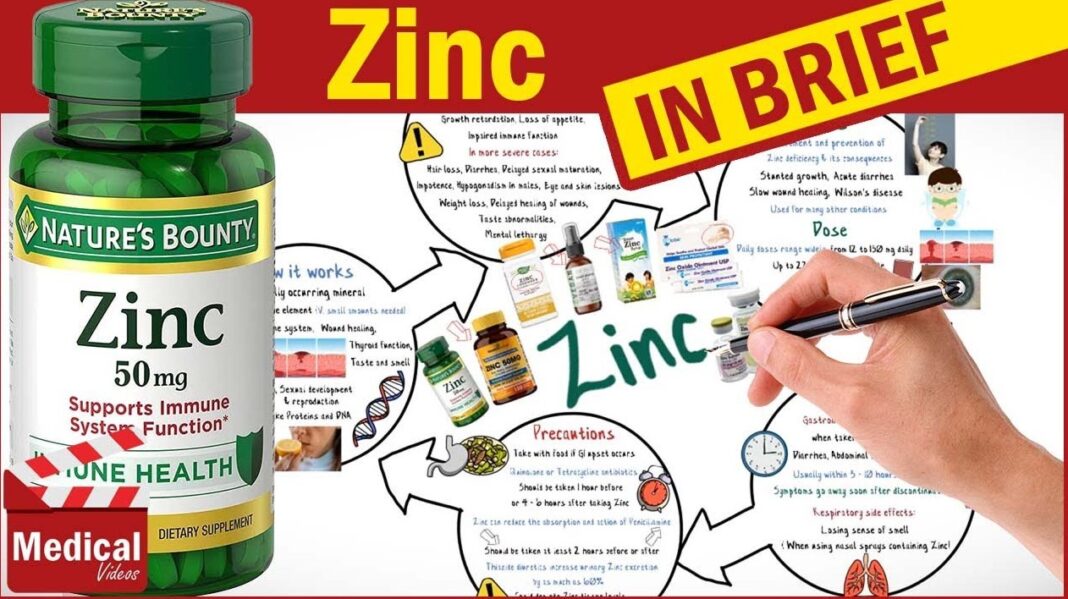BOURSESSENEGAL – Zinc supplements have gained attention in recent years for their wide range of health benefits. Many people turn to these supplements to boost their immune system, support skin health, and enhance overall wellness. Understanding the role of zinc in your body can empower you to make informed decisions about your health. In this guide, we’ll explore the benefits of zinc supplements, how to take them, potential side effects, and more.
What is Zinc?
The Essential Mineral
Zinc is a trace mineral essential for numerous biological functions. Your body requires zinc for immune function, wound healing, protein synthesis, DNA synthesis, and cell division. Despite its importance, your body doesn’t store zinc, which means you must obtain it through diet or supplementation.
Food Sources of Zinc
Before considering supplements, it’s wise to know which foods are rich in zinc. Good dietary sources include:
Meat (especially red meat)
Shellfish (like oysters and crab)
Legumes (beans, lentils)
Seeds and nuts (pumpkin seeds, cashews)
Whole grains
Dairy products
While you can get zinc from food, many people find it challenging to consume adequate amounts daily, making supplements an attractive option.
Health Benefits of Zinc Supplements
1. Boosting Immune Function
Strengthening the Immune System
One of the primary benefits of zinc supplements is their role in enhancing immune function. Zinc is crucial for the development and activation of T-lymphocytes, a type of white blood cell essential for immune response. Studies suggest that adequate zinc levels can reduce the duration and severity of respiratory infections and colds.
Supporting Antioxidant Activity
Zinc also acts as an antioxidant. It helps protect your cells from oxidative stress and free radicals, which can damage cells and contribute to chronic diseases. By supporting your body’s antioxidant defenses, zinc may help maintain overall health.
2. Promoting Skin Health
Wound Healing
Zinc plays a vital role in skin health and wound healing. Research shows that it aids in cell division and collagen synthesis, two processes crucial for skin repair. Many dermatologists recommend zinc supplements for those with acne or skin conditions like eczema.
Reducing Inflammation
In addition to promoting healing, zinc may help reduce inflammation in the skin. This can be particularly beneficial for individuals suffering from inflammatory skin conditions, leading to clearer and healthier skin.
3. Enhancing Cognitive Function
Supporting Brain Health
Some studies suggest that zinc is linked to cognitive function and memory. Adequate levels of zinc may improve mood and reduce symptoms of anxiety and depression. The mineral is involved in neurotransmitter function and may help protect against age-related cognitive decline.
Focus and Concentration
For those looking to enhance focus and concentration, zinc supplements could offer benefits. Some evidence suggests that zinc deficiency may negatively impact cognitive abilities, making supplementation a potential aid for mental clarity.
4. Promoting Reproductive Health
Male Fertility
Zinc plays a significant role in male reproductive health. It contributes to testosterone production and is essential for sperm development. Men looking to boost fertility may benefit from zinc supplementation, especially if they have low dietary intake.
Women’s Health
For women, zinc supports hormonal balance and menstrual health. Adequate zinc levels can help alleviate symptoms of PMS and support reproductive function.
How to Take Zinc Supplements
Recommended Dosage
While the recommended dietary allowance (RDA) for zinc varies by age and sex, adult men typically need about 11 mg per day, and adult women need about 8 mg. If you consider supplementation, choose a product that provides a dosage within these ranges.
Types of Zinc Supplements
supplements come in various forms, including:
gluconate: Commonly used for immune support.
picolinate: Highly absorbable form.
citrate: Often used for digestive health.
oxide: Common in topical applications but less bioavailable.
Consider your specific needs when choosing a supplement.
Timing and Interaction
For optimal absorption, take zinc supplements on an empty stomach. However, if you experience stomach upset, you can take them with a meal. Be cautious of potential interactions with certain medications, including antibiotics and diuretics. Always consult with a healthcare provider before starting any new supplement.
Potential Side Effects of Zinc Supplements
Common Side Effects
While zinc supplements are generally safe for most people, overconsumption can lead to side effects. Common issues include:
Nausea
Diarrhea
Stomach cramps
Headaches
To avoid these side effects, do not exceed the upper intake level of 40 mg per day for adults unless directed by a healthcare professional.
Long-term Use and Deficiency
Long excessive use of zinc can lead to copper deficiency and negatively impact immune function. Therefore, monitoring your intake and consulting with a healthcare provider is essential for safe use.
Who Should Consider Zinc Supplements?
At-Risk Groups
Certain groups may benefit from zinc supplementation, including:
Vegetarians and vegans: Those who avoid animal products may not get enough zinc from diet alone.
Pregnant and breastfeeding women: Zinc needs increase during pregnancy and lactation, making supplementation beneficial.
Older adults: Aging can affect zinc absorption, increasing the risk of deficiency.
Personalized Approach
Ultimately, whether you should take zinc supplements depends on your dietary intake, health goals, and individual health conditions. Consulting a healthcare provider can help you determine if supplementation is necessary for you.
Conclusion: Embracing Zinc for Optimal Health
Zinc supplements offer a range of health benefits, from boosting immune function to supporting skin and reproductive health. Understanding how zinc plays a vital role in your body can empower you to make informed decisions about your health.
Try Zinc for Yourself
If you’re considering zinc supplementation, explore different forms and dosages to find what works best for you. Remember to balance your intake with a healthy diet rich in zinc-containing foods for optimal results.
A Final Thought
Taking zinc supplements may be a simple yet effective way to enhance your overall wellness. As with any supplement, prioritize safety, listen to your body, and consult with a healthcare professional for personalized advice. Embrace the benefits of zinc and take a proactive step towards a healthier you!
REFERENCE : SURGASLOT88



